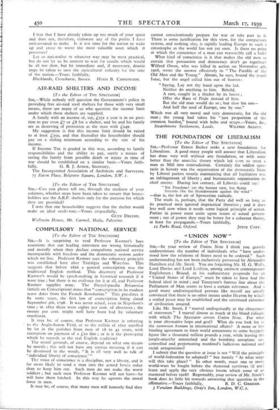[To the Editor of THE SPECTATOR] Snt,—It is surprising to
read Professor Kastner's bare assertions that our leading statesmen are wrong historically and morally when they declare compulsory national service incompatible with freedom and the democratic system under which we live. Professor Kastner says the voluntary principle was established here after Trafalgar and Waterloo. This suggests that before 1816 a general conscription was the traditional English method. This discovery of Professor Kastner's would be epoch-making in historical research if it were true ; but there is no evidence for it at all, and Professor Kastner supplies none. The Encyclopaedia Britannica (article on Conscription) states that " conscription in its modern sense dates from the French Revolution." This pre-dates it by some years, the first law of conscription being dated September 4th, 1798. It was never actual, even in Napoleon's time ; in 1810 there were eighty per cent. of absentees ; the twenty per cent. might well have been had by voluntary enrolment.
It may be, of course, that Professor Kastner is referring to the Anglo-Saxon Fyrd, or to the militia of 1812 enrolled by lot in the parishes from men of a to 45 years, with exemption on payment of a £m fine ; or is it the press-gang which he regards as the real English tradition?
The moral grounds, of course, depend on what one means by morals ; this will not have any serious meaning if it can be dismissed in the words, " It is all very well to talk of ' individual liberty of conscience.' " The voice of conscience is a discipline, not a liberty, and is far more likely to send a man into the armed forces today than to keep him out. Such men do not make the worst soldiers ; but such men Professor Kastner will not have—he will have them fetched. In this way he uproots the moral force in men.
It may be, of course, that many men will honestly find they
cannot conscientiously prepare for war or take part in it. There is some justification for this view, for the compulsory system, and nothing else, is rapidly leading Europe to such a catastrophe as the world has not yet seen. Is there no point at which the conscience of a man can reasonably call a halt?
What kind of conscience is it that makes the old men so certain that persuasion and democracy don't go together? Wilfred Owen, who was killed in action on November 4th, 1918, wrote the answer effectively in " The Parable of the Old Men and the Young." Abram, he says, bound the youth Isaac, but the angel called him out of heaven : Saying, Lay not thy hand upon the lad, Neither do anything to him. Behold, A ram, caught in a thicket by its horns ; Offer the Ram of Pride instead of him.
But the old man would do so ; but slew his son—
And half the seed of Europe, one by one."
Which was all very moral and very democratic, for the old man ; the young had taken his " just proportion of the common burden," bound with belts and straps.—Yours, &c.,
CC
Swarthmore Settlement, Leeds. WILFRID ALLOTT.










































 Previous page
Previous page